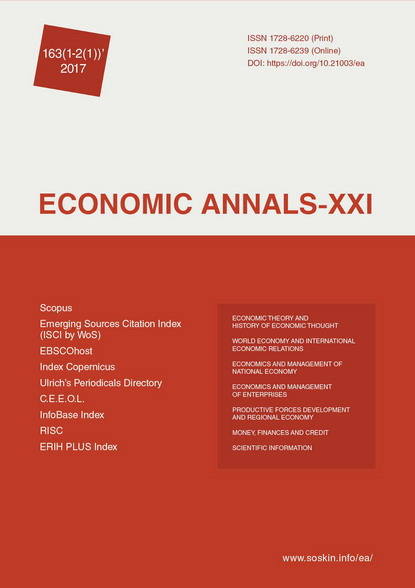Cross-border factor of educational migration of Ukrainian youth to Poland: social-economic opportunities and threats
Cross-border factor of educational migration of Ukrainian youth to Poland: social-economic opportunities and threats
Author(s): Olha HrynkevychSubject(s): Economy, Political economy, Politics and society, Demography and human biology, Sociology of the arts, business, education, Economic development, Socio-Economic Research
Published by: Institute of Society Transformation
Keywords: Educational Migration; Academic Mobility; Trans-Border Regions; National System of Higher Education; Factor Analysis of Variance; Opportunities; Threats;
Summary/Abstract: Introduction. The features of modern higher education its Internationalisation and growth of academic mobility are some of the features of modern higher education. These processes are particularly common in Ukraine. After signing the Association Agreement with the EU, Ukraine is facing a number of challenges, along with the enormous potential of European values and living standards. Ukrainian educational migration to Poland, a neighbouring country and an EU member state, is one of the challenges. The purpose of the study is to assess the impact factor of the border regions on the intensity of educational migration, to identify key opportunities and threats related to Ukrainian education because of youth migration. Conclusions. The results of the analysis of variance show that 75.3% of the variation in the number of foreign students in the provinces of Poland is related to their proximity to the border. The main reason for the mass migration of Ukrainian youth to Poland is the cross-border nature of the educational systems of both countries and the asymmetry of the main indicators of socioeconomic development. The main opportunities of the migration of young Ukrainians to Polish universities are related to the acquisition of intercultural communication experiences, formation of new social capital at the expense of students who get crossborder education. The key threats in this regard are associated with the loss of Ukraine’s social capital of youth who may not return to Ukraine after studying in Poland and reduced domestic demand in the domestic market of university education.
Journal: Економічний часопис - ХХІ
- Issue Year: 163/2017
- Issue No: 01+02
- Page Range: 26-30
- Page Count: 5
- Language: English

